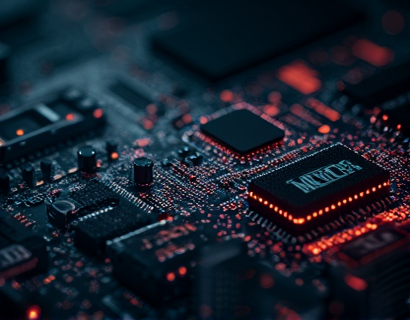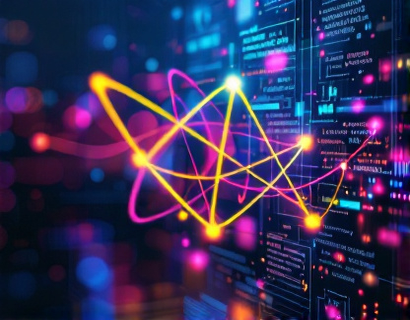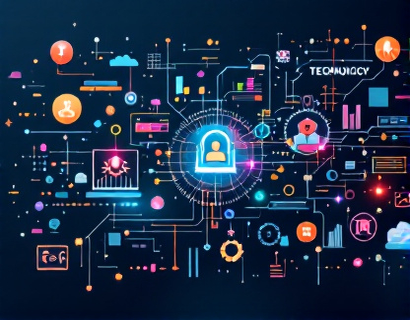Decentralized Innovation: Unlocking Next-Gen Digital Transformation with AI and Crypto Synergy
The digital landscape is undergoing a profound transformation, driven by the synergistic power of artificial intelligence (AI) and cryptocurrency. This convergence is giving rise to decentralized innovations that promise to redefine user experience and engagement across interconnected applications and services. As tech-savvy innovators and early adopters increasingly explore the realms of cryptocurrency, AI, and decentralized applications, it becomes imperative to understand how these technologies are reshaping the future of digital solutions.
Decentralized innovation, at its core, is about creating systems that operate without central authority or control. This paradigm shift is facilitated by blockchain technology, which provides a secure, transparent, and tamper-proof ledger for transactions and data storage. When combined with AI, the potential for transformative applications becomes immense. AI's ability to process vast amounts of data, learn from patterns, and make intelligent decisions enhances the efficiency, accuracy, and personalization of decentralized services.
Enhancing User Experience through AI and Decentralization
One of the most significant benefits of integrating AI with decentralized systems is the enhancement of user experience. Traditional centralized platforms often struggle with scalability and latency, leading to suboptimal user interactions. Decentralized applications (dApps) powered by AI can offer faster response times, higher reliability, and a more seamless user journey. For instance, AI-driven chatbots on decentralized platforms can provide instant, personalized support without the need for human intervention, ensuring that user queries are handled efficiently and effectively.
Moreover, AI can analyze user behavior and preferences in real-time, allowing for dynamic content curation and personalized recommendations. This level of personalization not only improves user satisfaction but also increases engagement and retention. In a decentralized ecosystem, users have greater control over their data, and AI can leverage this data to create highly tailored experiences without compromising privacy.
Driving Engagement with Decentralized Rewards
Engagement is a critical factor in the success of any digital platform. Decentralized innovations introduce novel reward mechanisms that incentivize user participation and contribution. Cryptocurrency tokens can be used to reward users for various activities, such as providing data, participating in governance, or contributing to the development of the platform. This token-based system creates a direct economic incentive for users to engage more deeply with the platform, fostering a more active and loyal community.
AI plays a crucial role in optimizing these reward systems. By analyzing user behavior and preferences, AI can dynamically adjust reward structures to maximize engagement. For example, AI can identify the most effective types of rewards for different user segments and tailor the distribution of tokens accordingly. This data-driven approach ensures that the incentive mechanisms are both fair and effective, leading to higher user retention and broader community involvement.
Security and Trust in Decentralized Systems
Security and trust are paramount in any digital ecosystem, and decentralized innovations offer robust solutions to these challenges. The decentralized nature of these systems eliminates single points of failure, making them less vulnerable to cyber attacks and data breaches. Blockchain's immutable ledger ensures that transactions and data are secure and transparent, building trust among users.
AI enhances this security by providing advanced threat detection and prevention capabilities. Machine learning algorithms can identify and mitigate potential security risks in real-time, adapting to new threats as they emerge. This proactive approach to security is essential in a decentralized environment where traditional centralized security measures may not be sufficient.
Efficient Data Management and Analytics
Data management and analytics are critical components of modern digital solutions. Decentralized systems, combined with AI, offer powerful tools for efficient data handling and insightful analytics. Blockchain-based data storage solutions ensure that data is distributed across multiple nodes, enhancing data integrity and availability. AI algorithms can process and analyze this distributed data to uncover valuable insights, drive decision-making, and optimize system performance.
Furthermore, AI can automate data management tasks, such as data cleaning, normalization, and integration, reducing the burden on human operators and minimizing errors. This automation not only improves efficiency but also ensures that data is always up-to-date and accurate, providing a solid foundation for AI-driven analytics and decision support.
Interoperability and Ecosystem Integration
Interoperability is a key challenge in the decentralized landscape, where multiple platforms and services need to work together seamlessly. AI and blockchain technologies are paving the way for more integrated and interoperable ecosystems. Smart contracts, powered by AI, can automate complex interactions between different decentralized applications, ensuring smooth data exchange and seamless user experiences.
AI-driven middleware solutions can facilitate communication and data sharing between disparate systems, breaking down silos and fostering a more cohesive digital environment. This interoperability is essential for building a robust and scalable ecosystem where users can seamlessly transition between different services and applications.
Case Studies and Real-World Applications
Several real-world examples illustrate the transformative potential of AI and cryptocurrency in decentralized innovations. One notable example is the use of AI-powered decentralized finance (DeFi) platforms, which offer financial services such as lending, borrowing, and trading without intermediaries. These platforms leverage AI to optimize trading strategies, assess credit risk, and detect fraudulent activities, enhancing the overall security and efficiency of financial transactions.
Another example is the deployment of AI-driven decentralized identity solutions. These solutions use blockchain to create secure and verifiable digital identities, empowering users to control their personal data and authenticate themselves across various platforms. AI algorithms can enhance these solutions by analyzing user behavior to detect and prevent identity theft and fraud.
Challenges and Future Directions
Despite the numerous benefits, the integration of AI and cryptocurrency in decentralized innovations is not without challenges. Scalability remains a significant issue, as blockchain networks can struggle to handle high volumes of transactions. Research into layer 2 solutions and more efficient consensus mechanisms is ongoing to address this challenge.
Regulatory uncertainty is another hurdle, as the legal framework for decentralized technologies is still evolving. Stakeholders must work collaboratively with regulators to create clear and supportive guidelines that foster innovation while ensuring consumer protection.
Looking ahead, the future of decentralized innovation with AI and cryptocurrency is promising. Advancements in AI, such as federated learning and edge computing, will further enhance the capabilities of decentralized systems. The growing adoption of blockchain and cryptocurrency in various industries will continue to drive the development of more sophisticated and user-friendly decentralized applications.
As the digital landscape continues to evolve, the synergy between AI and cryptocurrency will play a pivotal role in shaping the next generation of digital transformations. By leveraging these technologies, we can create more secure, efficient, and user-centric solutions that unlock new possibilities for individuals and organizations alike.










































